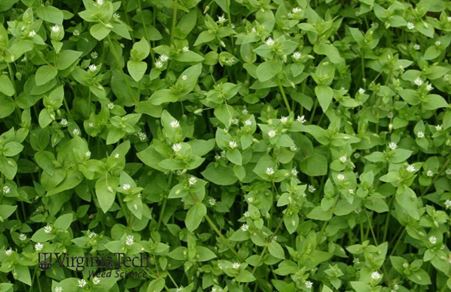Tales From the Help Desk: Chickweed
Q: I usually apply a pre-emergent herbicide in spring to kill chickweed. Is it OK if I go ahead and apply the pre-emergent now?
A. No. The use of a pre-emergent herbicide in winter would be ineffective because the weather is too cold for seeds to germinate. We tend to associate pre-emergents with spring because that is when we apply them to take care of crabgrass and other summer broadleaf weeds. I know for my lawn, applying pre-emergent herbicide is a spring ritual. However, chickweed, Stellaria media, is a winter annual that dies in the hot weather of summer.
Per the VT/VCE Weed Identification website (weedid.cals.vt.edu), chickweed seeds germinate in the fall. Therefore, application of a pre-emergent in spring is ineffective. A pre-emergent should be applied in the fall. The North Carolina State Extension article “Post Emergent Control of Chickweed” recommends applying a pre-emergent herbicide in September. The VCE Pest Management Guide (PMG): Home Grounds & Animals 2021 recommends the use of post-emergent herbicides when the chickweed is actively growing in the fall or spring. The PMG recommends using herbicides containing 2.4-D, alone or combined with other chemicals as defined in Tables 5.5 and 5.9.
The most environmentally friendly way to control chickweed is to pull the plants by hand or using a hoe. They have shallow roots and pull or hoe easily. After pulling, remove plants from the yard to avoid accidental seed distribution. Chickweed tends to like moist conditions and its presence can indicate compacted soil. Aerating the soil could help reduce the tendency for the weed to be present. Avoid cutting
grass too short; leaving the grass 3″ to 4″ high in the fall can help reduce the occurrence of chickweed.
This article first appeared in the February 2022 edition of The Colonial Master Gardener newsletter.

